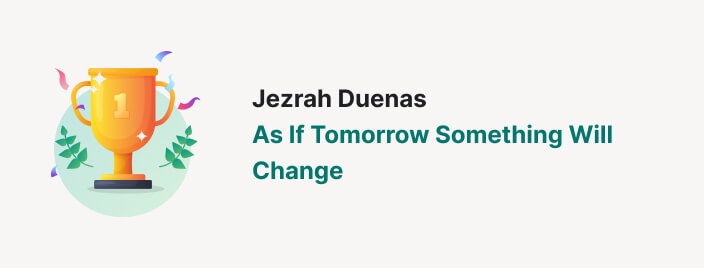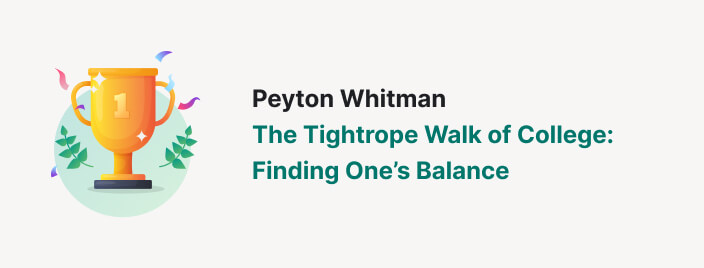Greetings friends,
Another year’s Essay Writing Contest Scholarship has come to an end. We’re now ready to announce the winners!
First, a quick recap:
The 2023 contest was somewhat unusual, as we received many more submissions than anticipated, which resulted in us having to postpone the results announcement. You probably remember this from our posts on social media. In total, we received 773 works and evaluated 578 of them. As with previous contests, a small percentage of submissions couldn’t be accepted due to issues such as, using an incorrect referencing style, plagiarism, or content not being related to any of the assigned topics.
We’re incredibly grateful to everyone who participated in this year’s competition.
Our selection criteria was as follows:
- MLA Referencing – 10 points
- Grammar, Punctuation, and Spelling – 20 points
- Organization – 20 points
- Content and Ideas – 20 points
- Use of Language and Style – 30 points
The 578 entries received an average of 65.1 points. Impressive!
Now, let’s announce our winners!
Our Essay Writing Contest Scholarship Winners are:

Jezrah Duenas with essay titled, “As If Tomorrow Something Will Change” received 88 points and took the $1,000 prize.
As If Tomorrow Something Will Change
“As if tomorrow something will change.” This thought is the one that emerges in from the minds of the students who continuously push themselves to work over a desk every single day. More profoundly though, this thought is a representation of a subconscious dependence on the world to change for us. The perpetual looming presence of the worry that tomorrow will be exactly the same as today, is the root behind what the student knows as burnout. Naturally, people are social beings that value connection and purpose in their lives, and we need it to both maintain and improve our health (Stiles). For this reason, constantly working towards something without any significant change can feel incredibly draining, and cause us to lose our foundational purpose. However, oftentimes we overlook that purpose itself can be created based on how we direct our lives, and we fall victim to the belief that the world has already defined our path. Understanding how this causes burnout to develop, and how it affects students is not only dire in overcoming the problem itself, but coming out of it a powerhouse with a reason behind steering our own ships.
Students are programmed in their academic careers to act a certain way, to obtain the best grades, and to prioritize their studies over anything else (Collins). As a college student myself, there are times where I feel like I’m mindlessly drifting where the pressure of my surroundings take me, like I am relentlessly struggling through my studies just to make it somewhere. And yet, when someone simply lends me an ear, suddenly I feel like all that pressure has been lifted, and my efforts weren’t made for nothing. As Psychology Research and Behavior Management discloses, “Students receiving more support were more likely to be satisfied with their life, and in turn may have less academic burnout” (Ye et. al). In other words, experiencing academic burnout means that we require more support and positivity outside of our work. We shouldn’t just prioritize our studies, but also enjoy our lives outside of the academic arena, starting with acknowledging the encouragement from those around us.
Connections we share with other people hold an incredibly endearing power that boosts our life satisfaction. Nevertheless, we should never take for granted the power we hold within ourselves to boost our desire to push forward. People are complex beings that can never truly be categorized. Valuing this uniqueness, and understanding that our motivations are fueled in completely different ways is one of the keys to eliminating burnout. Personally, I am enthralled by songwriting and music composition, and I consider it a passion of mine. As such, I very rarely experience burnout when those subjects appear in my academics. Touched on in An Important Piece of the Student Motivation Puzzle, “Students who are more motivated to learn persist longer, produce higher quality effort, learn more deeply, and perform better in classes and on standardized tests” (C. Hulleman & T. Hulleman). People are drawn to their passions, and motivation is birthed through them. When we use our individual passions to find positivity, inclusivity, and a sense of identity in our daily lives, we subsequently are able to find purpose behind our studies as well. We are able to find meaning behind pushing forward and realize that studying doesn’t have control over us, rather we have control over it.
Gaining the motivation to return to our studies comes with treasuring the daily. It means cherishing everything about our journey, and placing meaning behind each step we take no matter how small they may seem. Never has there been an instant cure or remedy to suddenly fix burnout. However, by slowly but surely inspiring ourselves to change, improvement becomes more than possible. After beginning to believe we have the ability to guide ourselves, finding purpose in our studies is simply a component that will follow. The path of life isn’t linear, and hoping that something will change based on a fixed routine is to limit ourselves to a story that we didn’t even write. So instead of thinking “As if tomorrow something will change,” begin to imagine the endless potential that awaits if we start believing “I will change for tomorrow.”
Works Cited
Collins, Jo. “Schools Are Prioritising Academic Achievement over Wellbeing and Growth, by States of Mind.” Progressive Education, 19 Nov. 2020, www.progressiveeducation.org/schools-are-prioritising-academic-achievement-over-wellbeing-and-growth-by-states-of-mind/.
Hulleman, Chris S., and Teresa Hulleman. “An Important Piece of the Student Motivation Puzzle.” FutureEd, 10 Jan. 2018, www.future-ed.org/reversing-the-decline-in-student-motivation/.
Stiles, Katie. “Human Connection: Why It’s Important.” Psych Central, 15 Nov. 2021, psychcentral.com/lib/the-importance-of-connection.
Ye, Yuqiao, Xiuyu Huang & Yang Liu.“Social Support and Academic Burnout Among University Students: A Moderated Mediation Model”, Psychology Research and Behavior Management, 14:, 2021, 335-344, DOI: 10.2147/PRBM.S300797

Peyton Whitman with essay titled, “The Tightrope Walk of College: Finding One’s Balance” received 86 points and took the $500 prize.
The Tightrope Walk of College: Finding One’s Balance
Students do not go to college simply to graduate. Students go to find parts of themselves, build relationships, and learn how to move forward. The same way people are not born to die, and a book does not start to finish, students are more than their ending. When they forget this, students can dive so deep into their work that they forget it is not all that they are. Burnout occurs when students suffer from extreme academic stress. They can begin to show a lack of motivation, an impaired ability to focus, and a decreased academic performance. The added stress of feeling as though they are falling behind can push them into a deeper state of anxiety and lethargy. In order to escape from this downward spiral, important work has to be done.
Student burnout is another way of saying “a lack of balance”. To restore that balance, students need to make sure they’re taking care of themselves in their everyday lives. Madhu Nair notes that this can include getting fresh air and exercise, leaving time for a social life, and leaving time for important hobbies. “How to Prevent Burnout in School [1-10]” (3). Procrastination and unreasonable goals are common villains in the struggle of trying to stay balanced, so setting up a routine and smaller goals for oneself can help students feel as though they are moving forward, and help them keep their momentum.
Burnout is also not as simple as a few tweaks in one’s daily routine – it’s a mental game. The art of fixing a student’s frame of mind goes outside anything that they can write inside of a planner. Andrei Kurtuy dives into the subject of what thought processes to look out for when dealing with burnout recovery in his article “Student Burnout | What Is It and How Can You Cope With It”. “1. Don’t compare yourself to others. 2. Follow your passions. 3. Listen to yourself,” (5). Kurtuy continues, talking of how “comparing your performance and grades to others can make you lose confidence and induce anxiety” (5), sticking with subjects that interest you “can keep you motivated, thus minimizing the risk of student burnout” (5), and knowing your limits can save your stress levels.
Even after a student has corrected their mindset, and worked towards a better balance, habits of work won’t change unless better habits and methods are developed. Coming back from burnout, the hardest part is not the quick assignments that a student can get done in under ten minutes, but the hours of studying ahead to be prepared for the tests and quizzes that await them. Victoria University published an article talking about how to find the motivation to study, and different methods of studying for people who are coming back to it. VU mentions that outside motivation in the form of friends and study groups helps when trying to get back into the swing of things. “A study buddy or study group can be helpful, as you’re working with people who have similar goals. You can quiz each other, discuss course content together and rally any members of the partnership or group who are feeling demotivated,” (9). When it comes to pushing oneself, sometimes an extra push from a friend can help keep both parties on track. VU ventures into alternative study techniques that incorporate breaks as well, such as the Pomodoro Technique. “Simply put, you: commit to 25 minutes of study, take a break for 5–10 minutes, repeat this four times, take a longer break” (8). This method can be tailored to one’s specific needs as well as help with time management as the student begins to understand how much time a task will take.
Student burnout can result in academic underperformance, anxiety, and a lack of motivation. Because of these symptoms, coming back from burnout can be incredibly difficult, and add more of a strain to the student’s mental health. It is important to remember to keep a balance when it comes to schoolwork, and prioritize one’s health. Exercise, socializing, and time to oneself are all important parts of college life. After all, students are not there just to graduate; students are there to live.
Works Cited
Kurtuy, A. (2022, August 2). Student Burnout: What is it and How Can You Cope With it. CareerBlog. https://novoresume.com/career-blog/student-burnout#:~:text=Student%20burnout%20is%20a%20type%20of%20burnout%20that%20comes%20from,creativity%2C%20and%20decreased%20academic%20performance.
Nair, M. (2022, December 12). Academic burnout: How to Prevent it and What to do. University of the People. https://www.uopeople.edu/blog/what-is-academic-burnout/
Smith, K. How to Find the Motivation to Study. Victoria University, Australia. (2020). https://www.vu.edu.au/about-vu/news-events/study-space/how-to-find-the-motivation-to-study
Our sincerest congratulations!
Well done to all those who participated in this year’s contest. Remember, you still have chances to win in future competitions! Stay tuned for further announcements on our writing contest and video contest pages!


![$1,500 Annual Essay Writing Contest Scholarship Winners Announcement [2020]](https://ivypanda.com/blog/wp-content/uploads/2020/07/close-up-gold-trophy-award-3d-rendering-309x208.jpg)

Very good chance. Participate to develop our knowledge and thank you for the chance.